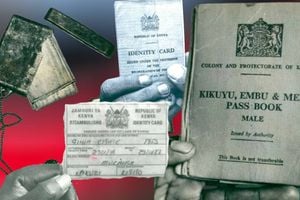
Principal Secretary for Immigration and Citizen Services, Julius Bitok addressing journalists at Serena Hotel, Nairobi on October 26, 2023.
The government is free to roll out the digital identity registration known as Maisha Card after the High Court lifted an order blocking its implementation.
The card, which the government had started implementing on a pilot basis in November last year before it was stopped by the court, contains a unique personal identifier (UPI) known as Maisha Namba.
The number, according to the government, will be the primary and lifelong registration and identification reference for holders.
The plan for a digital identity includes Maisha Namba, a unique personal number assigned to Maisha Card – a third-generation digital identity card, and the National Master Population Register – which is expected to consolidate existing and independent databases into a single roll.
Challenging the plan, Katiba Institute – a lobby – had argued that there was no data protection impact assessment and the rollout was being done without meaningful public participation or publishing key information relating to the implementation.
Immigration and Citizen Services PS Julius Bitok, however, told the court that data protection impact assessment was conducted before the piloting.
Through Attorney-General Justin Muturi, the government said Kenyans could not access national identification cards because of the petition.
During the launch of the pilot, Prof Bitok explained that Maisha Digital ID would be a lifelong personal identity number and that holders would easily access education, health insurance and other government services.
Maisha number will also serve as a Personal Identification Number for Kenya Revenue Authority and the National Social Security Fund. When the holder dies, it automatically becomes the death certificate number.
According to the government, the card will have a microprocessor chip with encrypted data for security and to minimise the risk of forgery. The card will also support the creation of a virtual identification, known as Maisha Digital ID, for those with smartphones.
Maisha Namba is meant to replace the stalled attempt to roll out the Huduma Namba. Kenyans are required to provide biographical information and biometric data, including date of birth, gender, facial image, parentage and contact information. Prof Bitok praised the ruling yesterday.
“It is a reprieve to more than 600,000 Kenyans whose application for new and duplicate ID cards could not be processed,” he said. The PS pledged to ensure the rollout of the system respects the Constitution.
“We commit to continue implementing reforms to the Kenya national identity ecosystem in a manner that respects the Constitution and our laws and in respect to the rights and the interests of citizens and clients of government services,” he said.
Prof Bitok added that engagement on the issue would go on. According to Katiba Institute, the High Court had on two occasions held that section 31 of the Data Protection Act requires the government to conduct an impact assessment before processing information needed for digital identification.
To set the ball rolling, the government published the Registration of Persons (Amendment) Regulations, 2023 and Birth and Deaths (Amendment) Regulations on October 25. But the lobby said the amendments were intended to facilitate the rushed rollout of Maisha Namba in violation of the Constitution.
“The amendments are also ultra vires, as the respondents exceeded their authority by using regulations to change the primary legislation and adopted regulations in violation of the Statutory Instruments Act,” Katiba Institute said.
It argued that the amendments were not subjected to public participation or publication and publicising of important information as required by the law.
Though the government said it would roll out the process on a pilot basis, Katiba Institute said it was not a small-scale test of the Maisha Namba to determine the feasibility as “alleged” but a nationwide rollout.












